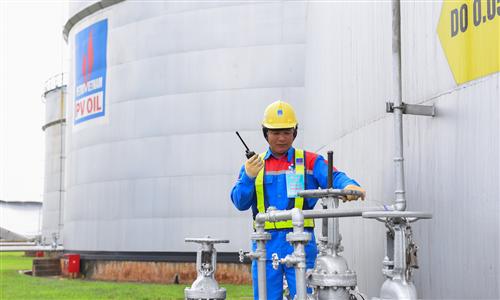U.S. launches circumvention inquiry on Vietnamese stainless steel sheet, strip: ministry
U.S. launches circumvention inquiry on Vietnamese stainless steel sheet, strip: ministry

The Vietnamese Ministry of Industry and Trade (MoIT) said in a statement on Friday that the U.S. Department of Commerce (DOC) has self-initiated an inquiry into possible circumvention of duty orders on stainless steel sheet and strip from China.
The possible circumvention involves stainless steel flat-rolled products from China that are completed in Vietnam and then exported to the United States.
This is the seventh circumvention inquiry self-initiated by the DOC, based on its own monitoring of trade patterns — a new trade enforcement tool created by the current administration of U.S. President Donald Trump.
Vietnamese authorities said the probe is based on available information which suggests stainless steel sheet and strip products from Vietnam may be within the scope of the antidumping and countervailing duty orders on China’s similar products.
Since 2016, the United States has imposed anti-dumping duties of 139 percent and 267 percent, respectively, on such products from China.
The DOC initiated the inquiry on the ground that Vietnamese manufacturers have been importing stainless steel flat-rolled inputs from China and processed them in Vietnam before shipping finished products to the United States.
The DOC alleged shipments of stainless sheet and strip from Vietnam to the United States increased in value by US$122 million, or 180.4 percent, comparing import data from the 40-month periods before and after the initiations of the investigations on Chinese stainless sheet and strip on March 2016.
Statistics from the MoIT revealed the exports of Vietnamese stainless steel sheet and strip to the United States had shown a downward trend in volume sales for the past three years.
The figure in 2017 was 32,000 metric tons before falling to 25,000 and 23,000 metric tons, respectively, in 2018 and 2019.
The General Department of Vietnam Customs said in a recent report that Vietnam spent $567 million on 932,000 metric tons of Chinese steel and iron products in the first quarter of 2020, down 33.4 percent in value and 32.3 percent in volume.
Similarly, the exports of Vietnam’s steel and iron products to the United States during the three-month period reached around 45,700 metric tons worth $44.03 million, down 68.5 percent and 62.4 percent, respectively.
Last year, the Vietnamese government slapped anti-dumping duties on stainless flat steel imports from China ranging from 17.94 percent to 31.85 percent in an attempt to minimize losses faced by local manufacturers, mainly those on the verge of bankruptcy.
The MoIT said on Friday that the DOC will issue questionnaires to solicit information from Vietnamese steel producers and exporters.
The questions are expected to concern their shipments of stainless sheet and strip to the United States and the origin of any imported stainless steel flat-rolled inputs being processed into stainless sheet and strip.
Therefore, the MoIT urged the concerned stakeholders to provide sufficient details, especially those related to their sources of raw materials and their management processes, as requested by U.S. authorities in a timely manner.
Otherwise, the DOC may rely on available information which usually puts these Vietnamese steel producers and exporters at a disadvantage during the investigation, according to the ministry.
The MoIT pledged to work closely with the DOC, the Vietnam Steel Association and relevant exporters to devise plans to support the businesses in an effort to safeguard their legitimate rights and interests.
In this case, if the DOC preliminarily determines circumvention is occurring, the department will instruct the U.S. Customs and Border Protection to suspend liquidation and begin collecting cash deposits on imports of stainless sheet and strip completed in Vietnam using Chinese-origin stainless steel flat-rolled inputs and/or Chinese-origin stainless sheet and strip further processed in Vietnam.
For products found to be circumventing the antidumping and countervailing duty orders, or subject to their scope, duties will be imposed on future imports and on any unliquidated entries from the date of initiation of the circumvention inquiry.
The DOC said the strict enforcement of U.S. trade law is a primary focus of the Trump administration. Since the beginning of the current administration, the department has initiated 27 new circumvention inquiries.




















